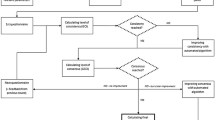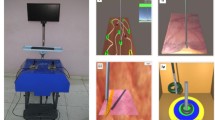Abstract
Background
The Minimally Invasive Surgical Trainer-Virtual Reality (MIST-VR) simulator is validated for laparoscopy training, but benchmarks and target scores for assessing single tasks are needed.
Methods
Control data for the MIST-VR traversal task scenario were collected from 61 novices who performed the task 10 times over 3 days (1 h daily). Data were collected on the time taken, error score, economy of movement, and total score. Test differences were analyzed through percentage scores and t-tests for paired samples.
Results
Improvement was greatest over tests 1 to 5 (improvement: test1.2, 38.07%; p = 0.000; test4.5, 10.66%; p = 0.010): between tests 5 and 10, improvement slowed and scores stabilized. Variation in participants’ performance fell steadily over the 10 tests.
Conclusion
Trainees should perform at least 10 tests of the traversal task—five to get used to the equipment and task (automation phase; target total score, 95.16) and five to stabilize and consolidate performance (test 10 target total score, 74.11).



Similar content being viewed by others
References
Brenner J (2002) Lernen und Üben im Interesse des Patienten. Trainingszentrum der Industrie—echte Alternativen. Minimal Invasive Chirurgie 11: 183–185
Chaudhry A, Sutton C, Wood J, Stone R, McCloy R (1999) Learning rate for laparoscopic surgical skills on MIST VR, a virtual reality simulator: quality of human–computer interface. Ann R Coll Surg Engl 81: 281–286
Gallagher AG, Lederman AB, McGlade K, Satava RM, Smith CD (2004) Discriminative validity of the Minimally Invasive Surgical Trainer in Virtual Reality (MIST-VR) using criteria levels based on expert performance. Surg Endosc 18: 660–665
Gallagher AG, McClure N, McGuigan J, Crothers I, Browning J (1999) Virtual reality training in laparoscopic surgery: a preliminary assessment of Minimally Invasive Surgical Trainer Virtual Reality (MIST VR). Endoscopy 31: 310–313
Gallagher AG, Richie K, McClure N, McGuigan J (2001) Objective psychomotor skills assessment of experienced, junior, and novice laparoscopists with virtual reality. World J Surg 25: 1478–1483
Gallagher AG, Satava RM (2002) Virtual reality as a metric for the assessment of laparoscopic psychomotor skills—learning curves and reliability measures. Surg Endosc 16: 1746–1752
Grantcharov TP, Bardram L, Funch-Jensen P, Rosenberg J (2003) Learning curves and impact of previous operative experience on performance on a virtual reality simulator to test laparoscopic surgical skills. Am J Surg 185: 146–149
Grantcharov TP, Kristiansen VB, Bendix J, Bardram L, Rosenberg J, Funch-Jensen P (2004) Randomized clinical trial of virtual reality simulation for laparoscopic skills training. Br J Surg 91: 146–150
Grantcharov TP, Rosenberg J, Pahle E, Fuch-Jensen P (2001) Virtual reality computer simulation, an objective method for the evaluation of laparoscopic surgical skills. Surg Endosc 15: 242–244
Jordan JA, Gallagher AG, McGuigan J, McClure N (2001) Virtual reality training leads to faster adaptation to the novel psychomotor restrictions encountered by laparoscopic surgeons. Surg Endosc 15: 1080–1084
McNatt SS, Smith CD (2001) A computer-based laparoscopic skills assessment device differentiates experienced from novice laparoscopic surgeons. Surg Endosc 15: 1085–1089
Seymour NE, Gallagher AG, Roman SA, O’Brien MK, Bansal VK, Andersen DK, Satava RM (2002) Virtual reality training improves operating room performance: results of a randomized, double-blinded study. Ann Surg 236: 458–463
Smith DA, Farrell TM, McNatt SS, Metreveli RE (2001) Assessing laparoscopic manipulative skills. Am J Surg 181: 547–550
Sutton C, McCloy R, Middlebrook A, Chater P, Wilson M, Stone R (1997) MIST VR. A laparoscopic surgery procedures trainer and evaluator. Stud Health Technol Inform 39: 598–607
Taffinder N, Sutton C, Fishwick RJ, McManus IC, Darzi A (1998) Validation of virtual reality to teach and assess psychomotor skills in laparoscopic surgery: results from randomized controlled studies using the MIST VR laparoscopic simulator. Stud Health Technol Inform 50: 124–130
Torkington J, Smith SGT, Rees BI, Darzi A (2001) Skill transfer from virtual reality to real laparoscopic task. Surg Endosc 15: 1076–1079
Torkington J, Smith SGT, Rees BI, Darzi A (2001) The role of basic surgical course in the acquisition and retention of laparoscopic skill. Surg Endosc 15: 1071–1075
Wilson MS, Middelbrook A, Sutton C, Stone R, McCloy RF (1997) MIST VR: a virtual reality trainer for laparoscopic surgery assesses performance. Ann R Coll Surg Engl 79: 403–404
Acknowledgments
We thank Michael Erdtmann from the ESI, Norderstedt, Germany, for valuable technical advice with the MIST-VR database and Prof. Manfred Nagelschmidt from the Biochemical and Experimental Division (University of Cologne, Germany) for valuable advice in preparing the manuscript.
Author information
Authors and Affiliations
Corresponding author
Rights and permissions
About this article
Cite this article
Hackethal, A., Immenroth, M. & Bürger, T. Evaluation of target scores and benchmarks for the traversal task scenario of the minimally invasive surgical trainer-virtual reality (MIST-VR) laparoscopy simulator. Surg Endosc 20, 645–650 (2006). https://doi.org/10.1007/s00464-004-2224-1
Received:
Accepted:
Published:
Issue Date:
DOI: https://doi.org/10.1007/s00464-004-2224-1




